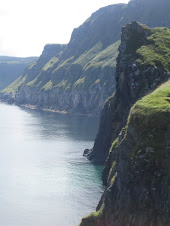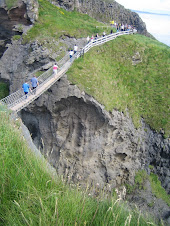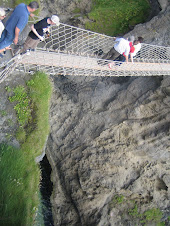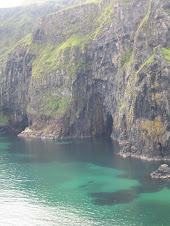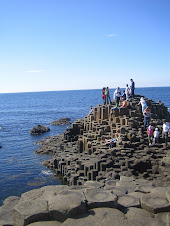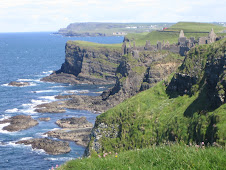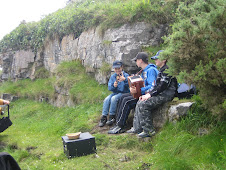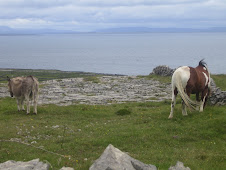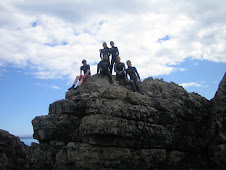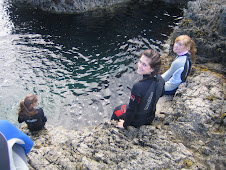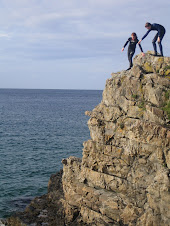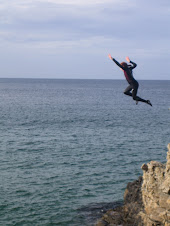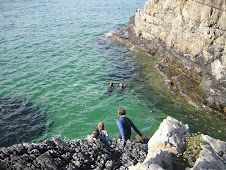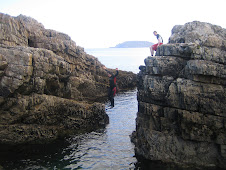Saturday, June 30, 2007
phase two
As the school year at Hazelwood has come to a close, my time working with those particular children has ended until the last week in July, during which I'll be helping out with the Hazelwood summer scheme. The purpose of the summer scheme is to prevent the students from getting mixed up in confrontations or fights, ultimately stemming from the conflict, since they're not preoccupied with their studies during the summer holiday. Until then, I'll be volunteering for the first three weeks of July at a different organization within North Belfast that also works with the youth community afflicted by the post-conflict aftermath. I presume that this work will be much more difficult than my work at Hazelwood, as these children will not necessarily come from homes in which the parents promote integration and peace. Furthermore, I'll also be volunteering on Wednesday nights at a Catholic youth group that provides hope and inspiration for youths susceptible to depression and suicide within the city. This is a reaction to the suicide crisis that has arisen throughout Northern Ireland, to which I referred in earlier posts. This second phase of my internship will begin on Monday, July 1st, and will run until the end of my internship. I was fortunate enough to run into these Catholic youthworkers while walking into the heart of the city with local girl my age, also volunteering to work with children in interface communities, who I met on the bus to Galway City. We were walking with some of her friends to the Belfast Festival, and tonight I'm going to see fireworks with a few of her friends I've met from Zimbabwe. The group is comprised of Baha'i teenagers who do cross-community work in East Belfast.
Tuesday, June 26, 2007
the past few days
Prior to leaving for Galway City and the Aran Islands (which were both absolutely brilliant or class, as the Belfast kids like to say), I went on a trip with the students on Friday morning to the Maze Prison, the location where many of the political prisoners from both Loyalist and Nationalist sides were held during the Troubles. It is most well-known for the 1981 Irish Hunger Strike, during which a group of republican prisoners protested for five years to be treated with the entitlements of political prisoners rather than of common criminals. The strike propelled nationalist politics and ultimately provided a foundation for Sinn Féin to become a powerhouse political party in Northern Ireland.
Upon returning from Galway for the weekend, I went with the kids yesterday to Newcastle, a gorgeous and quaint beach town located next to the Irish Sea and the Mourne Mountains. This morning, we hiked up Cavehill Mountain in Belfast with another group of students to raise money for the PIPS program (intervention in the increase of suicide rates in Belfast). The students were able to reflect upon their roles in the improvement of the Belfast community while amidst the peaceful and natural mountain setting; they also found themselves physically working together to assist each other up the somewhat strenuous mountain. It has been truly rewarding to walk through the halls and have students approach or hug me, smiling to say hi and chat; partaking in these various trips and activities have allowed for me to get to know a variety of students on a more personal basis and to hopefully have more of an impact on their individual lives and futures.







Wednesday, June 20, 2007
the fourth week
Aside from the Play for Peace session with the Harvard alumni and the Crossing the Atlantic discussion group on Monday, I've been involved with a variety of different activities and groups this week thus far. On Tuesday, much of the day was spent in preparation for the Issues Convention for that night, during which we introduced to the parents of the incoming students many of the different groups and activities that are available, including the multicultural groups and the Crossing the Atlantic group. At an integrated school, it is rather important to maintain a sense of trust, involvement, and mutual respect with the parents in order for the school to function successfully in Belfast, as the cooperation of the children is largely contingent upon enthusiasm from the parents. My discussion group worked an extra day this afternoon to finish our posters for the convention; they particularly worked on the "Why We Love Northern Ireland" poster, which was created to stir up a sense of nationalism and pride within the children who oftentimes only see the negative aspects of their community. It also, however, raised some tension concerning what should be included, such as support of the Northern Ireland football team (which was accused to be closer to the Protestant side than to neutrality). They also then worked on their "How Our Generation Can Contribute to the Future of Belfast on an Individual Level and Maintain Peace" poster, which created a significant amount of intelligent, passionate discussion amongst fairly young children (I was really impressed with their maturity throughout the discussion). Some of their ideas for alleviating sectarianism were to address cross-community issues, such as the environment and global warming (I somehow managed to get burned while hiking up Cavehill Mountain a few weeks ago since it didn't occur to me to pack sunscreen for Ireland); to promote integrated schooling throughout Northern Ireland; to mix the colors of the football jerseys so that they're not necessarily affiliated with one particular religion (the Northeastern students had met a man on the street who had been beaten for wearing a Celtic uniform in a local bar); to establish a Northern Ireland flag and downplay the use of the Irish flag and Union Jack; and to carry out simple tasks such as listening to one another regardless of alternating opinions. I realized that enhancing this notion of integration within the students' minds would be necessary when, just a few weeks ago, anti-Protestant grafitti appeared on a wall near the school's campus, presumably drawn by children in the area. It will also be important for myself and the other staffmembers to engage the students in the summer scheme, especially on July 12th (the Orange Parade), so as to occupy their free time and turn them away from the riots and confrontations with which their parents may be involved.
Today, I completed the first half of my PIPS training, which raises awareness of suicide in Northern Ireland (as well as in other parts of the world, I believe it started in Canada) and teaches people how to deal with potentially suicidal victims. There has been a significant increase of suicides in young people (often Catholic men in their teens or twenties), particularly in North and West Belfast. The community has begun to come together to address the severity of this issue: http://news.bbc.co.uk/1/hi/health/3538886.stm. This training will be helpful for the staff in the Alternative Department, as students often come into the Bungalow with symptoms of depression and feelings of anxiety; it has been believed that the increase in depression and increasing suicide rates among youths in Belfast is post-conflict aftermath of the Troubles. There seems to be a disparity between the emotional capabilities and coping methods between the teenage generation and the generation of parents, who may still be caught up in the mindset of the conflict. The training was extraordinarily powerful, moving, and effective; hopefully after gaining a little experience with suicide prevention in Belfast, I can reform my knowledge on the subject to apply to American societal situations in our own youth communities. Tomorrow, I'll complete the PIPS training; Friday morning I'll be helping out with the drama department's Shakespeare productions. Since I have this weekend off, I'll be travelling to Galway and to the Aran Islands to visit and explore the home of my own Irish ancestors.
Today, I completed the first half of my PIPS training, which raises awareness of suicide in Northern Ireland (as well as in other parts of the world, I believe it started in Canada) and teaches people how to deal with potentially suicidal victims. There has been a significant increase of suicides in young people (often Catholic men in their teens or twenties), particularly in North and West Belfast. The community has begun to come together to address the severity of this issue: http://news.bbc.co.uk/1/hi/health/3538886.stm. This training will be helpful for the staff in the Alternative Department, as students often come into the Bungalow with symptoms of depression and feelings of anxiety; it has been believed that the increase in depression and increasing suicide rates among youths in Belfast is post-conflict aftermath of the Troubles. There seems to be a disparity between the emotional capabilities and coping methods between the teenage generation and the generation of parents, who may still be caught up in the mindset of the conflict. The training was extraordinarily powerful, moving, and effective; hopefully after gaining a little experience with suicide prevention in Belfast, I can reform my knowledge on the subject to apply to American societal situations in our own youth communities. Tomorrow, I'll complete the PIPS training; Friday morning I'll be helping out with the drama department's Shakespeare productions. Since I have this weekend off, I'll be travelling to Galway and to the Aran Islands to visit and explore the home of my own Irish ancestors.
Monday, June 18, 2007
the first three weeks
So I just recently set up this blog and thus haven't yet had the opportunity to write in it, but I've kept a journal of my experiences in Northern Ireland so I'll try to update on the first third of my Belfast internship..
On the plane ride over, I met a member of the University of Pennsylvania athletic staff, also traveling to Belfast, who was eager to hear that I'd be involved in an internship involving social conflict in Northern Ireland. Although I would primarily be working with Hazelwood Integrated College,
On the plane ride over, I met a member of the University of Pennsylvania athletic staff, also traveling to Belfast, who was eager to hear that I'd be involved in an internship involving social conflict in Northern Ireland. Although I would primarily be working with Hazelwood Integrated College,
(integrated in that it encompasses both Protestant and Catholic children; college is equivalent to our middle school and high school students), he gave me the contact information of another primary school that also advocates peace resolutions for children, but I've been pretty consumed with work at Hazelwood and haven't had time to go over there. I was picked up by a woman with whom I've been working closely in Hazelwood's Alternative program (which functions in a framework concerning community service, social justice, peace & conflict studies, and so forth) and introduced to her wonderful family in Belfast. I was able to speak with her oldest daughter, age 17, briefly about the conflict, but she didn't seem to be too well-engrossed in it. Her family has ties to the Northern Ireland government, but the impression that I received from her was that the youth community suffers more from the post-conflict effects rather than from the Protestant-Catholic conflict itself. I also perceived that the terms "Protestant" and "Catholic" in Northern Ireland are truly more than mere religious groups. They naturally encompass the religious aspect and literal meanings of the religions themselves, but they also encompass cultural, political, and social implications. In fact, it seems that the Northern Irish (particularly the students and children) may claim to be one or the other but don't truly understand the totality of the religion; it's simply engrained into their minds at a young age that they are part of one particular group. I tried constructing an analogy to the racism problem in the states concerning color, nationality, and culture, but in actuality, the social conflict in Northern Ireland appears to be even more complex in that it involves such additional variables that wouldn't be intrinsically or necessarily factored into American conflict. Aside from this primary factor, moreover, now that the conflict has somewhat subsided and is much less apparent than it was even ten years ago, it is perhaps more problematic yet again in that there is an attempt to transform Belfast into a replication of the southern, cosmopolitan capital city of the Republic of Ireland, with its newly-emerging vivacious nightlife, tourist industry, booming business community, ecletic restaurants with influences from around the world, and so on and so forth. From a brief glance, this would certainly be the immediate resolution to elevate Belfast into a "community"; and yet not everyone here is quite ready to move to that next level. There are still numerous problems engrained into this society that have been overlooked and perhaps unconsciously swept under the rug. A third factor to consider is Northern Ireland and the rest of the United Kingdom's recent admission to the European Economic Union. As a result, many families from eastern Europe and Asia have immigrated into the Northern Ireland community, adding a racism variable to the social conflict here that is quite similar to what we experience in the states. There is a significant amount of tension within the adult community, including abrupt and blatant expressions of contempt, for the newly-immigrated ethnic minorities. Moreover, I noticed during my first week of observing classes at Hazelwood that, for instance, a Chinese boy was socially and academically isolated from the rest of his peers in an art class, and two Polish boys were ostracized and often discretely questioned/opposed by their classmates. It seems that such issues as diversity and multicultural awareness that are so heavily emphasized in American schools are new and unfamiliar to Northern Ireland schools, and this shows in the social interactions of their students. I spoke more about education in Northern Ireland with one of the other teachers with whom I've been working closely; she explained to me that the school tends to have a lot of students of lower socioeconomic status, as it is considered an "inner-city school" and thus their parents are more likely to have been occupied by the Protestant-Catholic conflict and the fighting/quarreling that necessarily accompanies it. As a result of this replication of values within the children, the kids tend to not be as focused in school since their parents don't emphasize such a lifestyle and they lack the confidence and drive necessary to succeed at the higher levels. The children with whom I've been working who are involved with the Alternative program tend to be, though are not necessarily, less academically-inclined and perhaps of more troubled family backgrounds. I'll get into a bit more detail as to the specifications of my various projects in a few moments.
Interestingly enough, the location of Hazelwood Integrated College is in North Belfast. I was informed that North Belfast is where many people died during the Troubles: it has interface communities that are close in proximity to one another. The North is therefore considered to be "mixed". West Belfast is predominantly Catholic; East Belfast is predominantly Protestant. South Belfast, where my flat is located right near the River Lagan and Queen's University, is the upper-class area where the better schools are located as well as the university students.
Interestingly enough, the location of Hazelwood Integrated College is in North Belfast. I was informed that North Belfast is where many people died during the Troubles: it has interface communities that are close in proximity to one another. The North is therefore considered to be "mixed". West Belfast is predominantly Catholic; East Belfast is predominantly Protestant. South Belfast, where my flat is located right near the River Lagan and Queen's University, is the upper-class area where the better schools are located as well as the university students.
City Centre:

North Belfast:
West Belfast (Gaelic Football Match Co Antrim vs. Co Derry):
It is also significant to note that Northern Ireland used to be much more affluent than the Republic of Ireland; they used to joke that the streets in the south were merely dirt roads with no signs or construction. Now, however, the tables have turned and it is in fact the Republic of Ireland that currently has a booming economy and society. From my perceptions and what I've been told, those still involved with the conflict are fighting for something that nobody wants. The Loyalists (Democratic Unionist Party, Ulster Unionist Party, Progressive Unionist Party, etc.) want Northern Ireland to remain part of the United Kingdom, but it appears that Britain is really far removed from the conflict in N. Ireland; the Nationalists (Sinn Féin, Social Democratic and Labour Party, etc.) want Northern Ireland to join with the Republic of Ireland and become one nation, but from my experiences in Dublin, the Republic is fed up with the conflict in the North and has become rather indifferent to its Northern counterpart's fate. Then, there are political parties such as the Green Party and the Alliance Party that wish to remove sectarianism from politics and work within both communities to contribute to the future state of Northern Ireland. I was fortunate enough to join a group from Northeastern University on a tour of the Parliament building in Belfast; the Northern Ireland government does not have unlimited and total control. As part of the Agreement, power must be shared between the Nationalists and the Unionists; but this power merely entails such matters as health, education, the environment, agriculture, transport, road safety, sports, and housing. The British Parliament maintains power over international relations, defense, income taxes, space exploration, and nuclear power. Belfast prisons just recently received handcuffs and other implementations of control. We were able to engage in conversations with leaders and speakers from the various political parties, and all agreed that Democratic Unionist speaker was very elusive and inarticulate. His arguments were not well-supported or explained, perhaps because he realized such a political party would not be well-received or understood by a group of Americans. However, it is very difficult to maintain an opinion of another country's politics when one has not experienced the height of its troubles or lived through such experiences as an actual citizen of that country.
Aside from helping out with odds and ends at the "Bungalow" (where the Alternative Program is held), I was involved in Speak Your Peace at Hazelwood where the children discussed differences in a safe environment. The day was created in light of the death of a Protestant Hazelwood student several years ago during the height of the Troubles. Allegedly, the student had been throwing rocks at a Catholic woman's car, and he was somehow run over by the car while on his bike. In alleged retaliation, a Catholic man received a phone call to leave work early because his girlfriend was in trouble; upon stepping outside of his work building, he was gunned to death. The Speak Your Peace day reflects upon the presence of the Troubles within Hazelwood's own community of Belfast. I co-led one group in which the children were engaged in various activities, such as discussing international stereotypes and Northern Ireland stereotypes and bringing in symbols that were significant to them as individuals and contributed to their self-perceptions and identities. This aroused a bit of trouble in that two Catholic boys used the tri-color (traditional Irish) flag as their symbol, and another Protestant girl displayed the Union (British) flag as her symbol. The boys were rude when the girl presented her symbol, which can be adequately explained; however, I was astounded when they were also rude towards another girl displayed a cross and described it as neither Catholic nor Protestant but simply a "Christian" symbol, stating that God was important to her. This indicates that the kids don't really know why they're Catholic or Protestant, but this type of behavior is just so heavily incorporated into their daily lives that they wouldn't even recognize their own hypocrisy. They also played a game called "Not in My House" in which they were given descriptions of various fictitious characters, such as a gay nurse, a member of the Orange Order, a Sinn Féin member, and so on and so forth, and they had to work as a team to hierarchically order which individual they would more likely allow to rent out their house if they themselves were the landlord. The kids were actually pretty conscious of sectarianism and thus both groups tied the Orange Order member and the Sinn Féin member; after the first round, they were given additional information that showed that the more "innocent" individuals, such as the schoolteacher, had flawed backgrounds (the schoolteacher had a history of sexual abuse with children) and the "less desirable" individuals, such as the member of the Orange Order, were actually decent individuals who each had a story and a reason for their contemporary lifestyles. It taught the children to not be so judgmental of others and to truly get to know people for who they are as individuals rather than generalizing them by their group's stereotypes.
Aside from helping out with odds and ends at the "Bungalow" (where the Alternative Program is held), I was involved in Speak Your Peace at Hazelwood where the children discussed differences in a safe environment. The day was created in light of the death of a Protestant Hazelwood student several years ago during the height of the Troubles. Allegedly, the student had been throwing rocks at a Catholic woman's car, and he was somehow run over by the car while on his bike. In alleged retaliation, a Catholic man received a phone call to leave work early because his girlfriend was in trouble; upon stepping outside of his work building, he was gunned to death. The Speak Your Peace day reflects upon the presence of the Troubles within Hazelwood's own community of Belfast. I co-led one group in which the children were engaged in various activities, such as discussing international stereotypes and Northern Ireland stereotypes and bringing in symbols that were significant to them as individuals and contributed to their self-perceptions and identities. This aroused a bit of trouble in that two Catholic boys used the tri-color (traditional Irish) flag as their symbol, and another Protestant girl displayed the Union (British) flag as her symbol. The boys were rude when the girl presented her symbol, which can be adequately explained; however, I was astounded when they were also rude towards another girl displayed a cross and described it as neither Catholic nor Protestant but simply a "Christian" symbol, stating that God was important to her. This indicates that the kids don't really know why they're Catholic or Protestant, but this type of behavior is just so heavily incorporated into their daily lives that they wouldn't even recognize their own hypocrisy. They also played a game called "Not in My House" in which they were given descriptions of various fictitious characters, such as a gay nurse, a member of the Orange Order, a Sinn Féin member, and so on and so forth, and they had to work as a team to hierarchically order which individual they would more likely allow to rent out their house if they themselves were the landlord. The kids were actually pretty conscious of sectarianism and thus both groups tied the Orange Order member and the Sinn Féin member; after the first round, they were given additional information that showed that the more "innocent" individuals, such as the schoolteacher, had flawed backgrounds (the schoolteacher had a history of sexual abuse with children) and the "less desirable" individuals, such as the member of the Orange Order, were actually decent individuals who each had a story and a reason for their contemporary lifestyles. It taught the children to not be so judgmental of others and to truly get to know people for who they are as individuals rather than generalizing them by their group's stereotypes.
I also organized another game for the younger children on communication and teamwork within groups of different kinds of people called "The Beast" in which the students were allocated various roles within an assemblyline type group and had to work together to replicate the original Beast that I created out of styrofoam balls, pipe cleaners, feathers, cottonballs, and so forth.
This week, I am being trained in a group called PIPS (prevention against suicide) that directly deals with the high suicide rate of Catholic youths in North Belfast. They seem to think it is another post-conflict effect; now that they are no longer required to fight in Sinn Féin's "army" and did not quite have the urgency or desire to attend university, many of the poorer Catholic youths feel idle and useless after they complete the required education of up to 16 years of age. Thus, some of them have resorted to suicide, including the son of the man who generated this program to combat such suicide. In light of this boredom with Northern Ireland and in addition to the lack of multicultural awareness in Belfast, I started a weekly "Crossing the Atlantic" lunch group where we discuss the differences between America and Northern Ireland, our various perspectives and stereotypes of one another, what the children love about Northern Ireland (which is difficult because they all seem to think that America is significantly better, to which I responded that America has conflict and problems as well, and that the average child's life is in actuality not exactly like the kids' lives on the MTV "reality" show "My Super Sweet 16"), and what they can do as individual human beings to contribute to the growing and future peaceful state of Northern Ireland. After listening to the speakers of the Green and Alliance Parties, I truly believe that the children of Northern Ireland are the foundation of a new Northern Ireland, not the perception of it that many of us continue to have as a war zone. In reality, they're just kids, and they just want to have normal lives and live in a normal environment. I'm also helping out with a Multicultural program to raise awareness of ethnic minorities in Belfast. Hopefully, these various activities that I've created or partaken in will make a difference in at least one of their lives and thereafter inspire them to proactively reform Belfast into a new Belfast.
This is just a brief summary of my internship thus far that occurs primarily during the week; on the weekends I've been fortunate enough to do a bit of travelling while keeping in mind my perception of Belfast and comparing the various other parts of these (two) beautiful countries to the city that I've come to call home. I was just in Dublin this past weekend, and I must say that despite its flaws and problems, I truly do prefer Belfast because, primarily, they treat Americans as people rather than as money. There is no show or concealment; Belfast projects itself to be what it actually is, in all of its detriments and all of its beauty.
Today, a group of alumni (including the grandfather of a Haverford senior!) from Harvard came to observe our Play for Peace group with the primary school children, during which we did various icebreakers and team games. The purpose of these games is to break the barrier between Protestant and Catholic children at a young age through play so that they can elevate these principles to everyday life situations when they grow older. I also had another session with my Crossing the Atlantic lunch group.
Today, a group of alumni (including the grandfather of a Haverford senior!) from Harvard came to observe our Play for Peace group with the primary school children, during which we did various icebreakers and team games. The purpose of these games is to break the barrier between Protestant and Catholic children at a young age through play so that they can elevate these principles to everyday life situations when they grow older. I also had another session with my Crossing the Atlantic lunch group.
Subscribe to:
Posts (Atom)
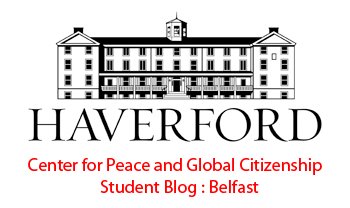





















































.jpg)

